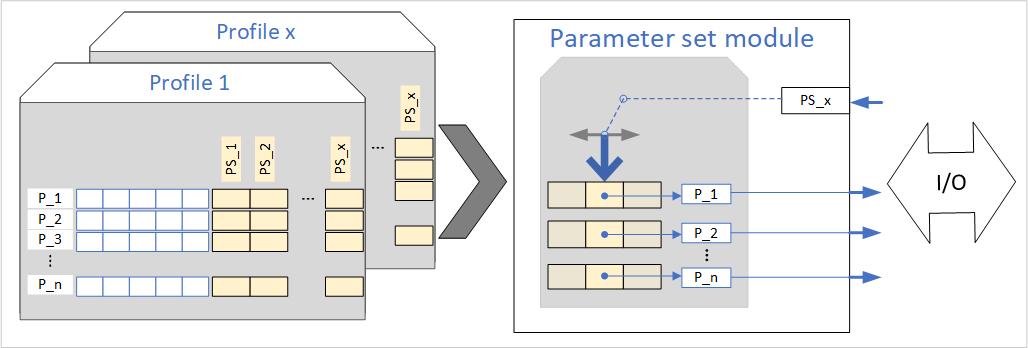This module type is always available. No license is needed.
The function of this module type is to read and output parameter sets depending on a key signal from stored tables. The value of each key signal is used to select one parameter set, which can contain any number of parameters. One possible application is, for example, the selection of a set of machine setting values depending on the product to be manufactured.
The parameter sets as well as the parameters themselves are defined in so-called profiles. In the profiles, you define the parameter sets with a name and selection value (numeric or as text) for the key signal. For the parameters you define the names, comments, units and data types as well as the values per parameter set.
The figure below shows the principle of the profile-based parameter set.

All parameter sets in a profile have the same parameters.
The parameter data can be entered into the profile line by line manually or via copy & paste from a table, e.g., in MS Excel.
A profile always contains a table with the parameter set definitions and two further tables with the analog and digital parameters. A key selector signal is used to select the parameter set by comparing the value of this signal with the entries in the parameter set definition.
If the value of the key signal matches the defined identifier for the parameter set, then the parameter values belonging to this parameter set are transferred to the module's analog and digital signals.
Subsequently, these signals can be displayed and recorded and used for other purposes, e.g., as input signals for a Process condition module.
The profile-based concept also offers the possibility of know-how protection and license-controlled use. With the know-how protection feature in the I/O Manager of ibaPDA, you can prevent the parameter sets from being viewed or modified. Furthermore, the use of a parameter set can be bound to certain license numbers (dongles) by means of the profile property.
To protect the profiles, see also Protecting profiles.